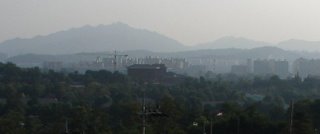On the same night as the last photo (the one of the city from Nam San (South Mountain)) I also took a spin past Nam Dae Moon (South Great Gate), one of the oldest surviving vestiges of Seoul's long history. Construction of the gate (according to Wikipedia) was started in 1395, just one year after "Hanyang", later named Seoul, was offically named as the new capital of Choseon, the name for Korea at that time. The whole city was surrounded in those times by a strong stone wall, designed to protect dwellers from thieves and wild animals.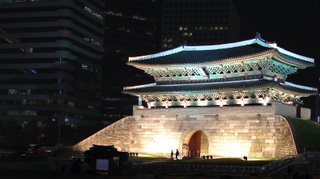 The wildest thing about the area now is the traffic, situated as it is, at the intersection of 5 major city streets and several lanes and alleys. It is only a five minute walk from Seoul Station, City Hall, and the ancient Doksu Palace.It gave its name to the adjacent Namdaemoon Market, one of the largest traditional markets in Korea, a hagglers paradise of sorts (and the best place in the city to get camera lenses and eyeglasses). This gate and the rotary that carries traffic around it is at the heart of Seoul's old downtown and the "Gahng Buk" or "North of the River" area of Seoul.
The wildest thing about the area now is the traffic, situated as it is, at the intersection of 5 major city streets and several lanes and alleys. It is only a five minute walk from Seoul Station, City Hall, and the ancient Doksu Palace.It gave its name to the adjacent Namdaemoon Market, one of the largest traditional markets in Korea, a hagglers paradise of sorts (and the best place in the city to get camera lenses and eyeglasses). This gate and the rotary that carries traffic around it is at the heart of Seoul's old downtown and the "Gahng Buk" or "North of the River" area of Seoul.
 The wildest thing about the area now is the traffic, situated as it is, at the intersection of 5 major city streets and several lanes and alleys. It is only a five minute walk from Seoul Station, City Hall, and the ancient Doksu Palace.It gave its name to the adjacent Namdaemoon Market, one of the largest traditional markets in Korea, a hagglers paradise of sorts (and the best place in the city to get camera lenses and eyeglasses). This gate and the rotary that carries traffic around it is at the heart of Seoul's old downtown and the "Gahng Buk" or "North of the River" area of Seoul.
The wildest thing about the area now is the traffic, situated as it is, at the intersection of 5 major city streets and several lanes and alleys. It is only a five minute walk from Seoul Station, City Hall, and the ancient Doksu Palace.It gave its name to the adjacent Namdaemoon Market, one of the largest traditional markets in Korea, a hagglers paradise of sorts (and the best place in the city to get camera lenses and eyeglasses). This gate and the rotary that carries traffic around it is at the heart of Seoul's old downtown and the "Gahng Buk" or "North of the River" area of Seoul.





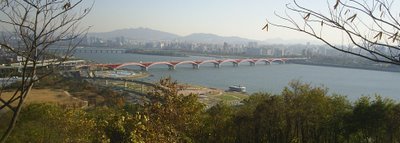
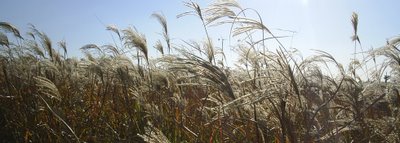





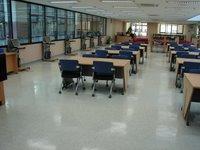



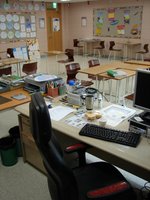
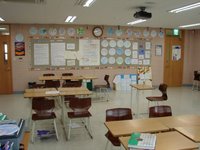



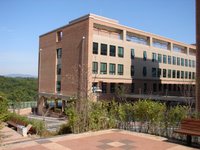





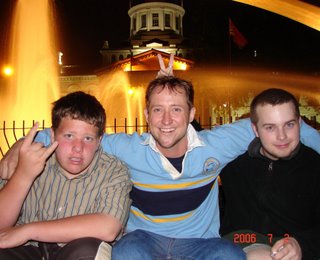 The above is Canada Day, 2006 in Kingston with Devin, the budding flyboy, and Conor, the gamer-genius, my sister's boys.
The above is Canada Day, 2006 in Kingston with Devin, the budding flyboy, and Conor, the gamer-genius, my sister's boys. 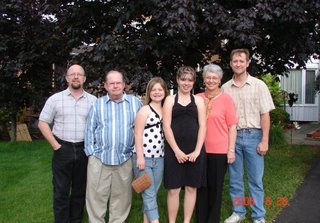 Above, from left, Phil, oldest brother and god (small "g") in his own right, Dad, Jessica, Stephanie (whose 8th Grade Grad it was that day), Mom, and a horribly coiffed moi at the homestead in Orangeville.
Above, from left, Phil, oldest brother and god (small "g") in his own right, Dad, Jessica, Stephanie (whose 8th Grade Grad it was that day), Mom, and a horribly coiffed moi at the homestead in Orangeville.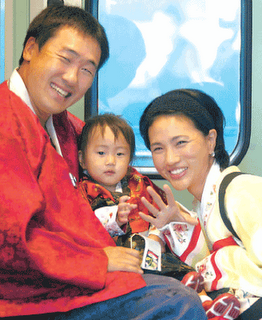 How very lovely, you say? Well, except that the holiday involves, for most, a lot more stress than joyous familial frolic. First off, being with the family involves making train or flight reservations months in advance or having to face up to 20 hours on the roads in an endless traffic jam.
How very lovely, you say? Well, except that the holiday involves, for most, a lot more stress than joyous familial frolic. First off, being with the family involves making train or flight reservations months in advance or having to face up to 20 hours on the roads in an endless traffic jam. 
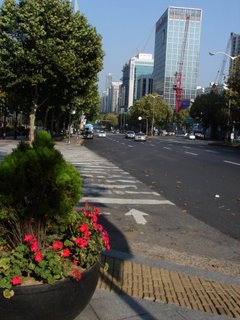


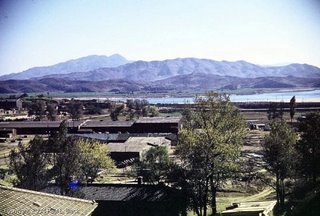 The second photo was taken today, and shows a similar view, albeit from a bit further away and to the West (they wouldn't let me on the Yongsan base to take photos - GO FIGURE!) but shows essentially the same thing. Those lush green fields to the south are long gone. The area south of the river, all farmland in 1960, is now home to some 7 million people and the dense development stretches well beyond the furthest of those mountains in the background.
The second photo was taken today, and shows a similar view, albeit from a bit further away and to the West (they wouldn't let me on the Yongsan base to take photos - GO FIGURE!) but shows essentially the same thing. Those lush green fields to the south are long gone. The area south of the river, all farmland in 1960, is now home to some 7 million people and the dense development stretches well beyond the furthest of those mountains in the background.